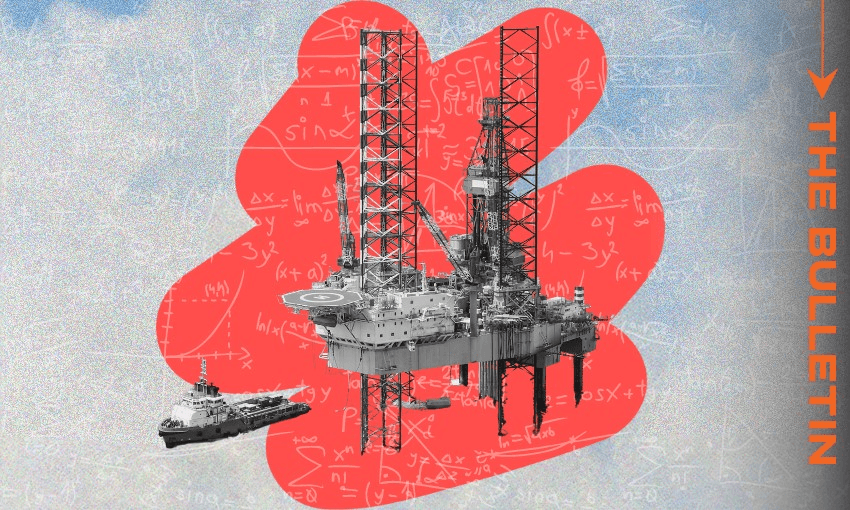It comes after the UN secretary-general made a veiled criticism of the government’s plan to reverse Labour’s ban, writes Stewart Sowman-Lund in today’s extract from The Bulletin.
To receive The Bulletin in full each weekday, sign up here.
More gas – and more exploration – on the way
The government has announced plans to allow for the importing of liquid natural gas (LNG) as New Zealand faces an ongoing energy crunch. Unveiled last night in the face of soaring electricity costs, the government confirmed it would legislate consents for a LNG terminal – a “medium term” solution expected to be in place by mid-2026. It was one a suite of measures, some new and some old, announced by the prime minister and his team of infrastructure-adjacent ministers – Chris Bishop, Simeon Brown and Shane Jones – to keep the lights on and power costs down. As The Post’s Tom Pullar-Strecker reported, that included recommitting to the controversial decision to reverse the ban on offshore oil and gas exploration, bringing it forward to the end of the year. “New Zealand currently has an energy shortage,” said Brown. “The lakes are low, the sun hasn’t been shining, the wind hasn’t been blowing, and we have an inadequate supply of natural gas to meet demand.”
A mix of old and new
Newsroom’s Marc Daalder noted that of the ten measures released yesterday, just four hadn’t previously been announced, though there is now an added urgency for some given the current crisis. Along with the planned LNG import facility, the new proposals include allowing lines companies to build new power generation and giving hydro generators permission to draw down on their lakes. There will also be a full review of the wholesale electricity market. In a wide-ranging interview with TVNZ’s Q+A on Sunday, Brown was asked why the government was choosing to invest in gas imports as opposed to targeting structural change within the energy sector, such as those detailed in this piece by The Spinoff’s Duncan Greive. “At this stage, the government’s sole focus is on making sure we’ve got enough supply into the market so that we’ve got the energy New Zealand needs,” said Brown.
Who’s to blame?
The opposition has claimed this is the wrong way to go about it and wants to play the blame game, explained the Herald’s Thomas Coughlan. Labour leader Chris Hipkins said the John Key-government had partially privatised the major gentailers, resulting in “billions of dollars of dividends” being paid out as opposed to prioritising new renewable electricity generation. There are “a lot of already consented renewable electricity that could be built right now in New Zealand that the large electricity-generating retailers are choosing not to build,” said Hipkins. The Greens’ energy spokesperson Scott Willis agreed: “Investing in fossil fuels in the middle of a climate crisis is like buying stocks in the Titanic.”
Writing for The Spinoff this morning, Lisa McLaren, from climate justice group 350 Aotearoa, made a similar argument. Not only could it take a long time for the effects of overturning the ban on new exploration to result in new gas coming online, despite the energy crunch being felt now, but the major gentailers have a “perverse incentive” to keep fossil fuels in the grid in order to distribute excess dividends.
In opting to renew exploration for oil and gas, the government is backing away from the Labour government’s commitment for a fully renewable energy sector by the end of the decade. Luxon called that a “bumper sticker, Post-it note idea”, reported Stuff’s Glenn McConnell.
PM heads into the Pacific
Writing in The Post this morning, Luke Malpass argued the government’s moves showed it was serious about the energy crisis and the prospect of energy rationing should be a wake-up call for a first world nation. Nevertheless, the prime minister can expect some hard questions in the days ahead as he jets off to join fellow leaders at the Pacific Islands Forum in Tonga. Deputy prime minister Winston Peters has been on the ground there since Sunday.
The timing of yesterday’s announcement couldn’t really be more tricky given the PM’s visit to Tonga. As the Herald’s Adam Pearse reported, UN secretary-general Antonio Guterres Guterres used his opening address at the forum to criticise governments that were choosing to seek more oil and gas exploration, though his focus was on the largest emitters. “They are signing away our future,” he said. “The G20 – the biggest emitters – must step up and lead, by phasing out the production and consumption of fossil fuels and stopping their expansion immediately. On Monday night, Luxon waved away any suggestion the secretary-general’s comments were a criticism of his government, instead saying they were broad remarks. Guterres told New Zealand reporters over the weekend that he did not discuss the proposed return of oil and gas exploration with Luxon while in the country, but believed it was unnecessary. “The only thing I can tell you is that the oil and gas that will be discovered from now, I am absolutely sure it will never be used.”


